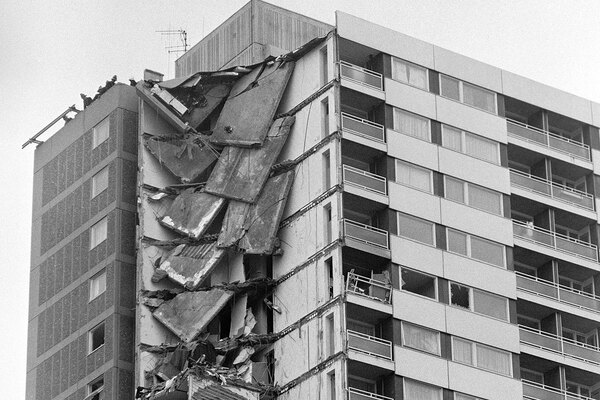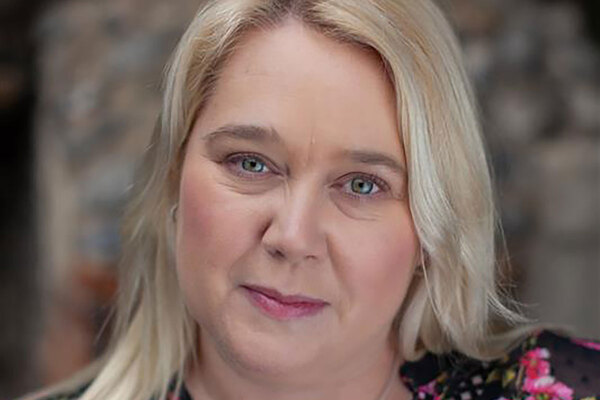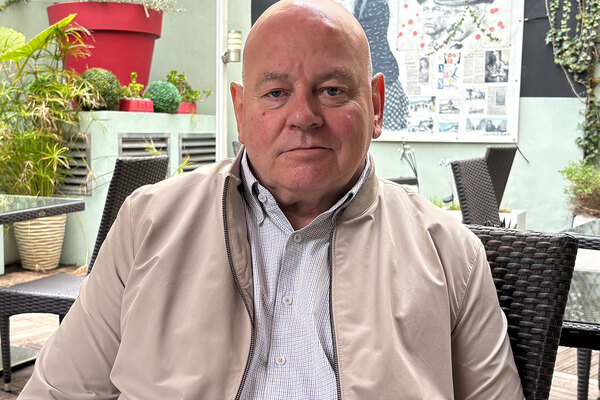The tenants’ climate jury: what happened next?
Almost a year ago, a group of tenants published a wide-ranging set of recommendations about how social landlords should approach climate change in existing homes, following a ground-breaking inquiry. Martin Hilditch meets the tenants who took part to find out if they are happy with the progress made. Illustration by Dominic McKenzie
Ten months ago, a group of tenants in the North of England published a stark warning about global warming.
The 30 tenants – the Social Housing Tenants’ Climate Jury – had been studying the issue over the course of three months as part of a project that was the first of its kind in the social housing sector.
Their report said that the process had “made us all understand the urgency of the situation. It’s been an education and it’s been eye-opening. Climate change needs to be taken seriously.”
It added: “This is real. This is urgent.”
Less than a year later, and with temperatures in the UK smashing previous highs, it feels like an appropriate time to reflect on their words and take stock. What, if anything, has happened since the jury published numerous recommendations about how the housing sector should tackle climate change? Are the jurors themselves happy with the progress and do they think they have made a difference? A few weeks ago, Inside Housing met with members of the jury to find out.
What has changed?
For the uninitiated, the jury was commissioned by the Northern Housing Consortium (NHC) and delivered in partnership with five housing associations – First Choice Homes Oldham, Karbon Homes, Salix Homes, Thirteen Group and Yorkshire Housing. It was based on the citizens’ assembly model – in which a collection of individuals selected to be representative of the wider population meet to discuss an issue and make recommendations based on deliberation.
Over a period of three months, the jury members interviewed experts including civil servants, academics, directors of housing and energy campaigners. They then set out a series of 10 recommendations (see opposite page) about how the housing sector should go about addressing climate change in existing properties.
The recommendations include how best to manage costs and disruption for tenants, how to speed up work, and a demand for housing associations and councils to collaborate more closely to make change happen faster.
So, let’s start with that first question: has anything changed as a result of the jury’s work?
Dawn Keogh, a tenant of Thirteen Group from Thornaby, says that her landlord has taken the findings to heart. The group has put all of the recommendations in a spreadsheet and is working through each one in turn, she says. Activity to date includes a pilot retrofit scheme in Hartlepool, she tells us.
“Our timeline is slipping away… So I think we have to be really dynamic about how we get the word out and how we engage more tenants”
It is the communication with tenants that Ms Keogh thinks is absolutely crucial to get right.
“One of my big things when I was on the jury was education,” she states (perhaps unsurprisingly, as she was working on her dissertation while sitting on the jury). “Tenants need to know what is going to happen to them. They need to know why they need to make the changes. If you’ve got someone who has been living in their home for 30, 40, 50 years, and all of a sudden it’s like, ‘you need this installation, you need new windows, you need an air source heat pump’, a lot of people are going to say, ‘oh my God, what’s happening?’ So, I said that you need to educate them.”
Off the back of the recommendation about communication, Thirteen Group set up a programme of carbon literacy training, which is being rolled out by the housing association’s sustainability team, Ms Keogh says. “They started it off with the staff first and then the tenants,” she says. The training includes information about why there is a need for action (for example, facts about climate change), information about retrofit programmes, and tips that tenants and staff can use to save energy in their day-to-day lives.
Ms Keogh also feels that the current cost of living crisis demonstrates why landlords should be taking the issue more seriously.
“I’m lucky that I can afford to pay my gas and my electric,” she says. “But my fear is the people without a voice who are living in homes that aren’t insulated correctly. And not only can they not afford [heating] in the first place, but when they use it, it’s disappearing.”
“I just think it makes everything more urgent,” she adds.
Steve Mackenzie, a tenant of Yorkshire Housing, says that from a slow start due to the organisation recruiting for a director of sustainability when the report was published, the organisation has since made real strides. Steve Ellard was appointed as director of assets and sustainability at the group in November last year.
“It was sort of held back by the fact there was nobody in authority to run the situation,” Mr Mackenzie says – demonstrating the importance that organisational structures and responsibilities play in driving change. “Now he’s fully on board, he’s fully committed.”
Since the jury’s report came out, Mr Mackenzie says that Yorkshire Housing has set up its own climate change group, composed of both residents and management. Again, this closely ties to a number of the report’s recommendations, such as establishing good communications between tenants and landlords and the importance of working together to drive change.
As well as change within his own landlord, Mr Mackenzie is very focused on his desire for the report to influence behaviour in a variety of ways right across the housing sector.
For starters, he thinks the model itself should be adapted and used to drive change in other areas of housing policy.
“We need to extend it,” he states. “We need to get more people involved, to get collaboration between housing associations, local authorities and other agencies – get them started with juries.”
“I hope the jury will be replicated throughout the country,” he adds.
The jury’s recommendations
- There is a need to take into account the urgency of the issue of climate change, and installation programmes need to be quicker.
- Housing associations need to work with contractors to ensure work is completed to the highest standard. An independent person or body should be appointed as a point of contact for tenants, to provide oversight to work, hold parties to account and mediate any issues.
- Because retrofit could be very disruptive, tenants need to have clear and timely information about timescales and cost.
- The best-quality technology should be used.
- Housing associations need to ensure good communication with tenants before, throughout and after any work is carried out.
- Housing associations should collaborate with each other and local authorities, and other agencies.
- Raise awareness with everyone in our communities about how we can tackle climate change through a range of communication channels. Communication must use clear, accessible language at all times.
- People in care homes, older and vulnerable people should be made aware of what is happening. Good, clear information should be provided in a format they can understand.
- Housing associations should employ a local dedicated person to work with the community to open community centres and develop green spaces – ensuring that people are more informed about the spaces, having a more connected approach and access to the facilities.
- Housing associations should be proactive in training and employing their own skilled workforce necessary to complete the work within timescales by 2050 and to allow for any repairs and replacements.
And while the climate jury has delivered on its initial brief, Mr Mackenzie thinks there is a strong reason for it to continue to meet.
“I think we have got to try and extend our reach,” he says. “I’ve started two groups on Facebook for residents and professionals to talk about climate change.”
Mr Mackenzie says he hopes the group, which he refers to as “unique, the first of its kind”, will carry on “for years to come”.
He has already been asked to meet online with a housing provider that wants to look at a similar model for work with its residents. He would love to see the model develop more widely – likening the first jury to the Ford Model T car. “It can only get better. No matter how good it was, things can improve.”
There is another reason for the jury to continue to meet, Mr Mackenzie adds: to “keep an eye” on the landlords that have been actively involved in the jury.
“I’m hoping the jury will continue to follow up on what the five associations are doing, so we can see how they are following up on the recommendations,” he says.
Ramp things up
What about the pace of progress since the report was published? Are jury members happy with both the sector’s response and the pace of the response?
Terry Tasker, a tenant of Yorkshire Housing, says that “the momentum has started building, but I think it is a slow momentum”. She says: “I think we need to start ramping things up a bit. Because if you listen to the various news and documentaries, our timeline is slipping away from us. So, I think we have to be really dynamic about how we get the word out and how we engage more tenants and residents.”
“We need to make sure we have communication that is clear and understandable for people to see why we’ve got to do this. We don’t really have a lot of choice”
Her advice for landlords reading this article? Good communication with tenants is absolutely vital in drawing up and communicating strategies for tackling climate change.
“We need to make sure we have communication that is clear and understandable for people to see why we’ve got to do this. We don’t really have a lot of choice.”
Thérèse Dixon, a tenant with Karbon Homes in Consett, County Durham, says one possibility might be involving young people in spreading the message – potentially with a series of talks in local colleges.
There is another reason Ms Keogh thinks the jury has been important, although it has little to do with climate change.
On top of its main purpose, she believes the jury has played an important role in tackling the stigmatisation of social housing tenants – a subject she is an expert in, as her university dissertation was about attitudes to social housing. This is because the jury placed tenants in a position of authority and expertise, delivering a high-profile and well-respected report. “This has a positive impact [on wider attitudes],” she says.
This is echoed by Ms Tasker, who says that, in part, her motivation for joining the jury was “the fact that, wow, somebody’s listening to me – somebody wants to hear my opinion as a resident”.
“That was a real good enticement to join the jury,” she says.
Ten months on from the publication of the jury’s report and it is clear that a number of the landlords that were most intimately involved in its creation have started to act on its recommendations. Other landlords are exploring the model for use in helping them deliver other policy agendas.
But as temperatures soared across the UK in July, the jury’s desire for social landlords to take more urgent action perhaps feels like the most important recommendation of all.
Sign up to the Tenant and Resident Engagement Conference
Join us at this leading one-day event designed to help landlords and tenants achieve meaningful engagement following the Social Housing White Paper sector reforms, covering culture change, co-production and how to engage tenants on climate change, building safety, disrepair and more.
There is a free tenant place for every delegate pass booked by a landlord.
To view the agenda and book your delegate pass, click here.













